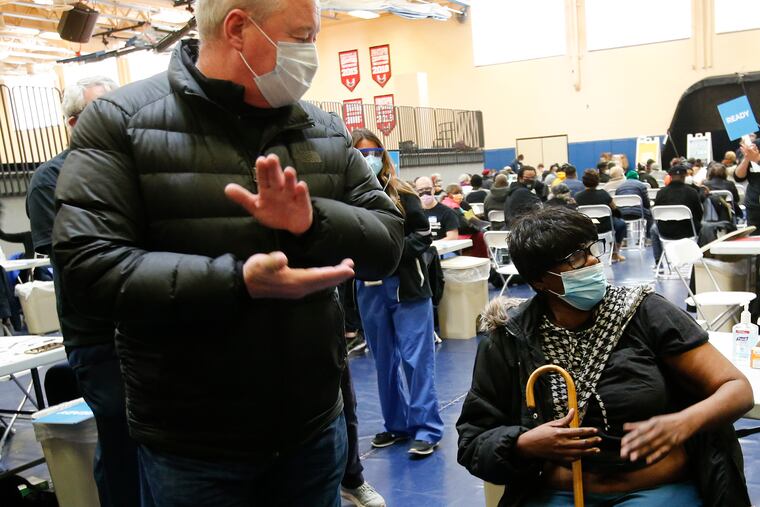Philly is expanding vaccine eligibility to 65 and older as it scrambles to get shots into arms
Getting more COVID-19 vaccine doses has made the expansion possible. But now comes the logistical problem of administering that larger supply.

Philadelphia expanded coronavirus vaccination eligibility Wednesday to all residents 65 and older, matching the age requirements in the rest of Pennsylvania and addressing the complaints of frustrated seniors as the city’s vaccine supply continues to increase.
The expansion, which took effect Wednesday, was possible because the city is receiving more doses from the federal government each week. Philadelphia gets its supplies separately from the rest of Pennsylvania, and so it has separate rules. But as the city’s federal allocation steadily increases, officials are scrambling to find enough providers and clinics to get shots into people’s arms.
“The limiting factor is probably going to be how many providers we have getting shots into arms per week rather than the number of doses arriving in the city,” Health Commissioner Thomas Farley said Tuesday. “That’s where we are now. That’s probably where we will continue to be for the foreseeable future.”
Philadelphia differs greatly from the rest of Southeastern Pennsylvania, where tensions are rising as county officials urge the state to give them more doses and say they have untapped capacity to administer shots.
Mayor Jim Kenney’s administration projects that the city’s weekly allocation will increase rapidly in the next several weeks, growing from about 70,000 doses arriving this week to at least 150,000 by the end of May.
And Farley estimated this week that the city could achieve herd immunity by June.
» READ MORE: More COVID-19 vaccine should go to counties that want it most, suburban Philly lawmakers tell state
Despite those rosy predictions, it remains unclear exactly how the city will accelerate the pace at which it doles out shots. Health officials say it’s difficult to make firm plans more than a few weeks in advance, but some City Council members are pushing for more details — and residents are impatiently awaiting vaccination.
The city’s vaccinations nearly doubled last week, in large part due to the federal government-run mass clinic at the Convention Center, which is inoculating almost 6,000 people per day. That increase made it possible to include people 65 and older. Previously, the city was vaccinating residents 75 and older, along with frontline workers and people with certain medical conditions. The age limit had frustrated residents between age 65 and 74, because the rest of the state opened access in January to anyone older than 65.
But that federal site will administer first doses for only two more weeks before shifting to giving second doses for three weeks, and it’s only scheduled to remain open until the end of April.
Health Department spokesperson James Garrow said the city knows only three weeks in advance how many doses it will receive of each of the three available vaccines, making definitive plans impossible.
“As much as we would prefer to have this effort planned out to the day, we cannot make any firm plans beyond three weeks ahead,” he said Wednesday. “And then, we only have three weeks in which to identify sites, identify providers, identify partners, and identify staff in addition to supporting clinics.”
The city already isn’t administering vaccines at the pace they arrive. During the week of Feb. 22, for example, the city received 63,960 total doses from the federal government and administered 51,300 doses — using just 80% of its allocation.
Farley has said that the Pfizer vaccine, which goes mostly to hospitals because it must be stored at ultra-cold temperatures, isn’t getting into arms as quickly as he would like. He said Tuesday that hospitals are doing more community clinics and outreach, but still aren’t using up all of their doses.
“Many hospitals still do have the Pfizer vaccine in their freezer,” he said.
Garrow said demand still exceeds supply for the Moderna vaccine, which can be stored at higher temperatures and used by more providers.
Councilmember Allan Domb, who has urged Kenney to open a vaccination site at the stadium complex in South Philadelphia, said he has doubts about the city’s ability to increase the pace of vaccination.
“We’re sitting on doses of vaccine,” he said, adding that he’s concerned the problem will only grow.
Domb and Councilmember David Oh voted against legislation last week to provide the Kenney administration with additional funding for pandemic response, citing their dissatisfaction with the vaccination plan. Some of their colleagues echoed those concerns but said they would rather focus on helping Kenney to increase the number of vaccine clinics and ensure racial equity in distribution.
“We’re all rowing in the right direction because we want to see the equitable distribution or this vaccine readily available to people across the city and neighborhoods across the city,” Councilmember Cherelle Parker said at last week’s Council meeting.
Garrow said health officials are “actively planning to expand distribution capacity” and will soon announce the first round of awards of city funding for vaccination sites. And the administration’s distribution plan released last week noted that officials have vetted more than 100 potential sites for vaccine clinics and found 60 that could be used.
The city’s plans and timelines will continue to shift, Garrow said. For example, he noted that the federal government has not yet communicated to city officials how President Joe Biden’s announcement that there will be enough doses for all American adults by the end of May could accelerate allocations.
And while Farley said Tuesday that he has hopes of a more normal summer and herd immunity by June, he added: “But please don’t hold me to that.”
Staff writer Justine McDaniel contributed to this article.